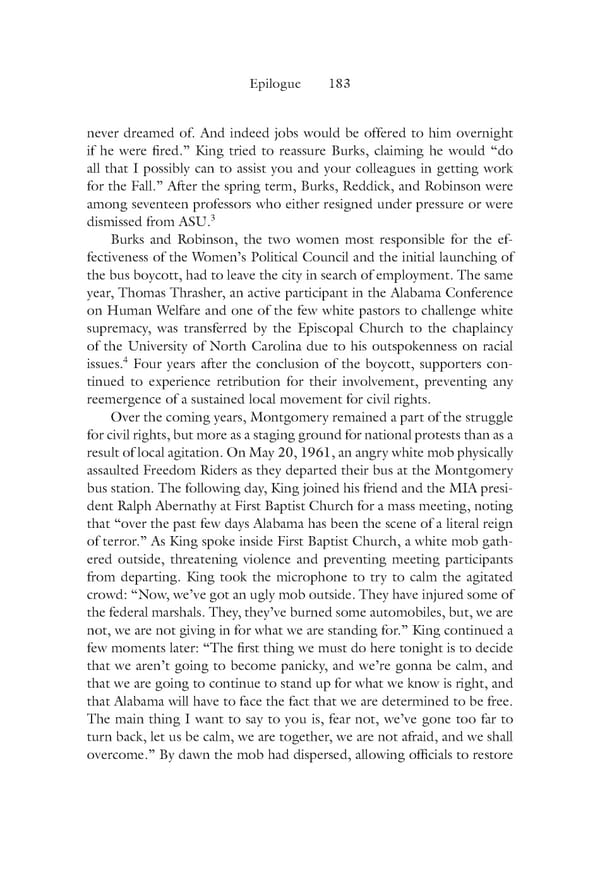Epilogue 183 never dreamed of. And indeed jobs would be offered to him overnight if he were fired.” King tried to reassure Burks, claiming he would “do all that I possibly can to assist you and your colleagues in getting work for the Fall.” After the spring term, Burks, Reddick, and Robinson were among seventeen professors who either resigned under pressure or were 3 dismissed from ASU. Burks and Robinson, the two women most responsible for the ef- fectiveness of the Women’s Political Council and the initial launching of the bus boycott, had to leave the city in search of employment. The same year, Thomas Thrasher, an active participant in the Alabama Conference on Human Welfare and one of the few white pastors to challenge white supremacy, was transferred by the Episcopal Church to the chaplaincy of the University of North Carolina due to his outspokenness on racial 4 Four years after the conclusion of the boycott, supporters con- issues. tinued to experience retribution for their involvement, preventing any reemergence of a sustained local movement for civil rights. Over the coming years, Montgomery remained a part of the struggle for civil rights, but more as a staging ground for national protests than as a result of local agitation. On May 20, 1961, an angry white mob physically assaulted Freedom Riders as they departed their bus at the Montgomery bus station. The following day, King joined his friend and the MIA presi- dent Ralph Abernathy at First Baptist Church for a mass meeting, noting that “over the past few days Alabama has been the scene of a literal reign of terror.” As King spoke inside First Baptist Church, a white mob gath- ered outside, threatening violence and preventing meeting participants from departing. King took the microphone to try to calm the agitated crowd: “Now, we’ve got an ugly mob outside. They have injured some of the federal marshals. They, they’ve burned some automobiles, but, we are not, we are not giving in for what we are standing for.” King continued a few moments later: “The first thing we must do here tonight is to decide that we aren’t going to become panicky, and we’re gonna be calm, and that we are going to continue to stand up for what we know is right, and that Alabama will have to face the fact that we are determined to be free. The main thing I want to say to you is, fear not, we’ve gone too far to turn back, let us be calm, we are together, we are not afraid, and we shall overcome.” By dawn the mob had dispersed, allowing officials to restore
 Becoming King: Martin Luther King Jr. Page 203 Page 205
Becoming King: Martin Luther King Jr. Page 203 Page 205